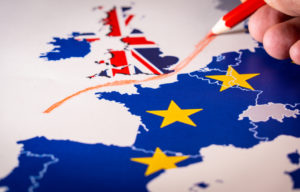
The initial news from the ports on the first working day since the UK left the EU was positive in terms of smooth passage through the port, but with levels of traffic reduced and the finalisation of the deal only coming a few days before the holiday break, this may be a false sign.
Nevertheless, here is a summary of some of the key changes. Please do bear in mind that this is a very brief snapshot of the rules. For more information see the HMRC Support page or contact us for specific advice tailored to your circumstances. Equally, there are different rules applicable to Northern Ireland.
Changes for those importing goods from EU member states to the UK
- VAT for goods coming from the EU will now be treated as non-EU imports. The introduction of ‘postponed accounting’ for Import VAT from 1 Jan 2021 means that UK VAT registered businesses can account for import VAT at the time of their VAT return rather than having to pay it soon after the goods arrive in the UK.
- Customs declarations will be required for all goods movements and the payment of any other duties will still be required.
- Customs duty (tariffs) will apply to some goods.
- Excise duties will continue to apply to tobacco, alcohol and certain energy products.
- Customs and excise duty payments can be deferred by UK businesses to be settled monthly with a duty deferment account. Taxpayers will need to register with HMRC to open a duty deferment account and will need to provide a bank guarantee.
- When selling to UK customers, UK VAT on transactions with a value of up to £135 will be collected at the point of sale.
- This means that UK Supply VAT, rather than Import VAT, will be due on these items.
- Businesses operating as Online marketplaces (OMPs), and facilitating the sale of imported goods, are responsible for collecting and accounting for UK VAT, even when the goods are in the UK at the point of sale.
- Where goods are sold directly to UK consumers and sent from overseas, the overseas seller is required to register and account for UK VAT to HMRC. Overseas sellers are responsible for accounting for the VAT on goods in the UK when sold directly to UK consumers.
- Business-to-business sales not exceeding £135 in value are also subject to the new rules. However, where the business customer is VAT registered and provides its VAT registration number to the seller, UK VAT will be accounted for by the customer by means of a reverse charge mechanism.
Exporting goods from the UK to the EU
- VAT registered UK businesses continue to be able to zero-rate sales of goods to EU businesses.
- EU member states will treat goods entering the EU from the UK in the same way as goods entering from other non-EU countries. This means import VAT and any customs duties (tariffs) are due when the goods arrive in the EU.
Common Transit Convention (CTC)
- Businesses may be able to use the Common Transit Convention (CTC). Not only does this mean that customs duties and declarations will not have to be dealt with at every border, there but it also defers import VAT and customs duties until goods reach their final destination.
Guarantees
- Businesses should check if a guarantee is needed to cover import VAT or customs duties while the goods are in transit. New procedures are being implemented to minimise the impact of this.
Distance Selling Threshold
- Distance selling is where sales are made to non-taxable persons, eg, consumers or non-VAT registered businesses. Previously, exporters who had a low value of sales in other EU member states could benefit from the distance selling thresholds. Sales below the distance selling thresholds were subject to UK VAT unless the supplier had registered for VAT in the country of destination.
- From 1 January 2021, this facility is no longer available.
EC Sales List
- UK VAT registered businesses no longer have to complete an EC Sales List. Instead, UK businesses exporting zero-rated goods to EU businesses need to retain evidence to prove that goods have left the UK. Such evidence is already required for exports to non-EU countries.
- For more information see HMRC support.
Supplying services to customers in EU member states
Place of supply
- The supply of services to customers in the EU from 1 January 2021 is now treated the same as those to any customer outside the EU and is covered by the ‘place of supply’ rules.
- These rules are complex and beyond the scope of this note.
- Generally though, for UK businesses supplying digital services to non-business customers in the EU, the ‘place of supply’ continues to be where the customer resides. VAT on those services is therefore due in the EU member state in which the customer resides.
- For UK businesses supplying certain insurance and financial services, the input VAT deduction rules changed from 1 January 2021. Supplies that were previously exempt became outside the scope with recovery, thereby aligning with the existing rules for supplies of such services to customers outside the EU.
Specific rules for digital services – Exports from UK to EU
- After 31 December 2020, all supplies of digital services to consumers in EU member states are liable for VAT in the consumer’s member state and those sales must be declared to the relevant EU member state.
- UK businesses that had been using the UK VAT Mini One Stop Shop “MOSS” union scheme will need to register for the VAT MOSS non-union scheme in an EU member state, for example, the Republic of Ireland is favoured due to language similarities.
- For businesses wanting to continue using MOSS, they must register for the scheme by the 10th day of the month following their first sale after the UK leaves the EU. For example, register by 10 February 2021 if a sale is made in January 2021.
- Alternatively, organisations can register in each EU Member State where they make sales. Check the EU’s Europa website for further information about registering for VAT in EU member states.
- Non-UK businesses that had previously used UK VAT MOSS non-union scheme through the UK will now need to register for the scheme in an EU member state.
Specific rules for digital services – Exports from EU to UK
Non-UK businesses need to declare sales of digital services to UK consumers by registering for VAT in the UK and declaring the sales via a UK VAT return.
EU VAT refund system
- UK businesses can continue to claim eligible refunds of VAT from EU member states, but it will need to be done using the existing refund system for non-EU businesses. The way in which the refund system operates varies across each EU country, so businesses will need to check the requirements in each EU country where they incur VAT.
- How to claim a refund of VAT paid in an EU member state
EU VAT Registration Number Validation service
- The EU VAT Registration Number Validation service allows businesses to check if a customer or supplier’s VAT number is valid. UK businesses will be able to continue to use the EU VAT number validation service to check the validity of EU businesses, but UK VAT registrations will cease to be included.
- HMRC has developed a service to ensure that UK VAT numbers can continue to be validated.
- For checking EU VAT numbers: https://ec.europa.eu/taxation_customs/vies/
- For checking UK VAT number: https://www.gov.uk/check-uk-vat-number
The information in this article was correct at the date it was first published.
However it is of a generic nature and cannot constitute advice. Specific advice should be sought before any action taken.
If you would like to discuss how this applies to you, we would be delighted to talk to you. Please make contact with the author on the details shown below.








